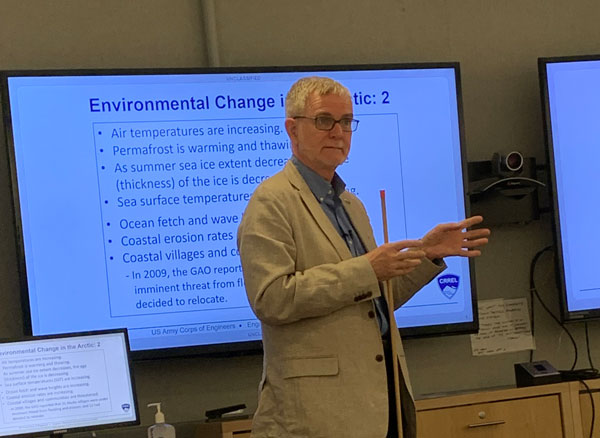
A federal geophysicist told a Sandia audience last month that understanding rapidly changing Arctic weather conditions is vital to understanding the global climate.
“We can’t ignore Alaska. It’s not just their problem; it’s ours,” said Martin O. Jeffries.
Jeffries is acting technical director and research physical scientist at the U.S. Army Cold Regions Research and Engineering Laboratory. His talk was titled “Understanding and Predicting the Rapidly Changing Arctic: The Need for Enhanced Collaboration in Research.”
Among problems he discussed was the dramatically named polar vortex, credited with bringing wildly cold temperatures to the Midwest.
“The polar vortex has gotten the attention of many people over recent years,” Jeffries said. “It happens because the jet stream is weakening and doing more meandering. That’s because the Arctic is warming more quickly, which breaks down temperature differences” between Alaska and the lower 48 states. “There have always been outbreaks [of extreme cold] but now they are happening more frequently and in longer duration.”
Jeffries, former executive director of the Interagency Arctic Research Policy Committee and past member of the White House Office of Science and Technology Policy, delivered his low-key insights with a calm demeanor that lent additional emphasis to his analysis.
“Not only has cold air reached south, but warm moist air gets up into Alaska, which leads to more rain in winter, creating thinner ice that changes the earth’s energy balance,” he said. “The ice has become much ‘younger,’ a proxy term for thinner.”
The ice, which breaks up more easily, leads to a dark ocean that absorbs energy and warms, rather than an iced-over ocean that reflects incoming energy upward. The thin ice also is weaker in restraining waves from crashing onto the coast where Native Alaskans live.
Jeffries left the changing face of nature to mention a commercial fact that has promoted collaborations among scientists: “A bright spot,” he said unexpectedly, “are lower-cost airfares.”
Increasing interest in the changing Arctic also has led to widely attended ministerial-level meetings to discuss Arctic-area problems and their larger implications. The sessions took place in 2016 and 2018 in the U.S. and Germany, respectively, with a third to be hosted by Iceland in Japan in 2020.
Jeffries’ talk, held in a small Sandia lecture hall, attracted an audience of about two dozen, with 50 more watching online. The talk was sponsored by Sandia’s Earth Science Research Foundation Speaker Series.
The next scheduled speaker in the series is U.S. Arctic Research Commission chair Fran Ulmer on May 23 at the Steve Schiff Auditorium.